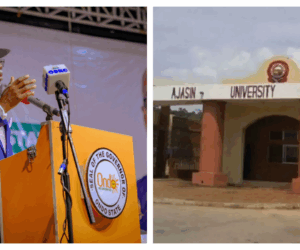The decision by the National Economic Council (NEC) at its 152nd meeting, chaired by Vice President Kashim Shettima at the Presidential Villa, Abuja to endorse the Solar Irrigation Pumps developed by the National Agency for Science and Engineering Infrastructure (NASENI) for a nationwide rollout ahead of the 2025 dry-season farming has been hailed as one of the most significant steps yet in Nigeria’s journey toward food security, sustainable energy, and technological self-reliance.
It is not just a policy announcement but a signal that government is ready to back local innovations with practical implementation, linking science and engineering directly to the daily struggles of farmers across the country.
With the dry season farming only a few months away, the National Economic Council members agreed that the deployment of solar irrigation technology was urgent and necessary. The decision came after NASENI successfully presented its ready-made pumps, which are not mere prototypes but working systems designed with the realities of Nigerian agriculture in mind.
SPONSOR AD
The Council directed the Minister of Budget and Economic Planning, Senator Abubakar Atiku Bagudu, to work out modalities to fund the mass production and distribution of the pumps to farmers nationwide.
For decades, irrigation in Nigeria has been dominated by fuel-powered pumping systems. While they have provided the backbone of dry-season farming, especially in the northern states, their long-term burden however on farmers has been immense. Rising fuel prices, erratic supply, mechanical breakdowns, and environmental consequences have made them increasingly unsustainable.
For many smallholder farmers, the cost of fuel alone eroded whatever profit they hoped to make from their harvests. With rural communities often far from reliable fuel stations, the challenge of getting and storing fuel added another layer of difficulty. Over time, this dependence on fuel-based pumps locked farmers into cycles of high cost, low returns, and uncertainty.
The solar-powered irrigation pumps developed by NASENI promises to break this cycle as they run on clean, renewable energy, eliminating the need for constant fuel purchases and reducing the cost of operation to near zero after installation.
For farmers, this translates into a tangible opportunity to expand cultivation without worrying about fuel costs eating up their profits. For the country, it means the chance to increase agricultural productivity, reduce food imports, and strengthen rural economies. And for the environment, it represents a decisive step away from the reliance on fossil fuel toward a greener, more sustainable farming system.
The endorsement by NEC is also a milestone for NASENI itself, as the Agency was established to drive technological innovation in Nigeria, with a mandate framed around the Agency’s initiative of Creation, Collaboration, and Commercialization (3Cs).
The NASENI Solar Irrigation Pump is an embodiment of this vision. Created locally, in collaboration with partners and stakeholders, and designed for mass commercial use, it stands as proof that Nigerian institutions can build solutions that respond directly to national challenges. The decision to back this product on a national scale is, therefore, also a recognition of the Agency’s growing role in the country’s industrial and agricultural transformation.
Vice President Shettima underscored the importance of the pumps during the NEC meeting, noting that they were not experimental but fully developed systems ready for rollout. He described them as a critical intervention that would replace expensive fuel pumps, reduce costs for farmers, expand dry-season cultivation, and even serve as a source of backup electricity for households.
He also emphasized that adopting clean energy for irrigation could allow Nigeria to benefit from international carbon credit schemes, providing additional income streams for both government and farmers.
The Executive Vice Chairman of NASENI, Mr. Khalil Suleiman Halilu, who expressed delight at the Council’s resolution describing it as a vote of confidence in local innovation, said the decision reflected the government’s seriousness about using technology to boost food production and improve livelihoods.
He praised President Bola Ahmed Tinubu for consistently supporting NASENI’s initiatives and ensuring that the Agency remains at the forefront of advancing industrialization, technology transfer, and food security.
Beyond harnessing solar power, NASENI incorporate digital innovations that allow for modern farming practices. Reports indicate that the pumps are fitted with GPS tracking, mobile app dashboards, and usage monitoring tools, giving farmers greater control over how they use the systems.
These features also make it possible to design flexible financing schemes, such as pay-as-you-go models, which would allow farmers to spread out payments over time instead of bearing the heavy upfront cost at once. In a country where many smallholders operate on very tight margins, this level of financial flexibility could be crucial for adoption.
The endorsement aligns with President Bola Ahmed Tinubu’s Renewed Hope Agenda, which places special emphasis on food security, industrialization, and self-reliance. The President has repeatedly stressed the need to boost local production, reduce dependence on imports, and empower Nigeria’s farmers to feed the nation.
In July 2024, President Tinubu said ““We will continue to drive local production and ensure that we produce what we eat and use locally,” reaffirming his administration’s commitment to addressing food security concerns in the country and driving down the cost of living for the citizens, while speaking during the public presentation of Chief Olusegun Osoba’s book “My Life in the Public Eye” in Lagos.
This recent approval by supporting the rollout of NASENI’s Solar Irrigation pumps, the administration is tying its agricultural policies to tangible tools that can make a difference in the fields. It is a practical response to a pressing challenge, and one that is expected to have ripple effects across multiple sectors of the economy.
Farmers themselves have welcomed the development with optimism. In states like Bauchi, Kano, Jigawa, Kebbi, Sokoto, Benue, and Nasarawa, where dry-season farming is common and irrigation is indispensable, the prospect of switching to solar power is seen as transformative.
Many recall how fuel shortages or price hikes at critical times in the season left their fields parched and yields diminished. The ability to irrigate crops without worrying about daily fuel expenses or the availability of petrol and diesel could open up opportunities for larger-scale farming and more stable incomes. It could also encourage more young people to take up farming, reducing rural unemployment.
Observers have also pointed out the symbolic value of the NEC decision. In a country where dependence on imported technologies and foreign solutions has often been the norm, the backing of a locally developed innovation marks a turning point.
It shows that Nigerian scientists and engineers are capable of creating tools that meet the country’s unique needs and that government is willing to trust and support such homegrown solutions. This, they argue, could inspire more research, innovation, and entrepreneurship across other sectors of the economy.
Reducing the use of fossil fuel-powered irrigation pumps would help cut greenhouse gas emissions and align Nigeria more closely with global climate goals. The possibility of earning carbon credits through clean energy adoption in agriculture further adds to the attractiveness of the initiative, potentially unlocking international funding and support.
Beyond the immediate benefits, the rollout of NASENI Solar Irrigation Pumps also promises to stimulate new industries around production, installation, and maintenance. Young Nigerians with skills in engineering, solar technology, and digital systems could find new opportunities for employment.
Local businesses involved in manufacturing components, batteries, and software applications could also grow, creating an ecosystem around the pumps that extends beyond farming into technology and industry.
The NEC endorsement thus represents more than a new irrigation system; it is a multi-layered intervention that touches on food security, energy policy, climate change, job creation, and industrial growth. It is about linking the farmer’s field in Sokoto or Benue to the engineer’s workshop in Abuja, the policymaker’s desk in the Villa, and the broader global movement toward sustainability.
The timing is especially significant, with the 2025 dry-season offering a crucial opportunity to demonstrate that these pumps can make a real difference. The rollout would lay the groundwork for more ambitious interventions in the future, not just in irrigation but across other areas where technology can transform agriculture.
As preparations begin for the mass production and distribution of the NASENI Solar Irrigation pumps, the focus will shift to execution. Government agencies, private partners, and farmer cooperatives will need to work together to ensure that the systems reach those who need them most and that their potential is fully realized.
What is at stake is not just the success of a technological innovation but the livelihoods of millions of Nigerians and the broader goal of national food security. For now, though, there is renewed hope in the air, the endorsement of NASENI’s Solar Irrigation Pumps has planted a seed that could grow into a harvest of abundance.
In the villages and fields where farmers toil, in the towns where food prices are debated daily, and in the halls of government where policy is shaped, there is a shared recognition that this decision could mark a new chapter in Nigeria’s agricultural story. By nurturing it with commitment and vision, the NASENI Solar Irrigation Pumps would help turn the dry-season into a season of plenty, powering not just crops, but the dream of a self-sufficient and prosperous nation.








